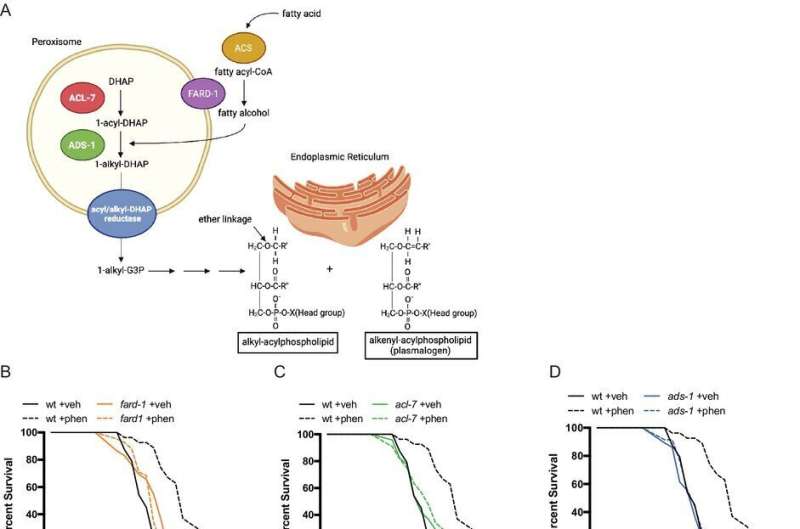This article has been reviewed according to Science X's editorial process and policies. Editors have highlighted the following attributes while ensuring the content's credibility:
fact-checked
peer-reviewed publication
trusted source
proofread
Study reveals how diabetes drug extends lifespan in lab models

Metformin, the most commonly used drug to treat type 2 diabetes, not only lowers blood sugar levels but has been revealed to extend lifespan in C. Elegans—an animal model that shares similar metabolic systems with humans and is often used to model human diseases.
New research led by investigators at Massachusetts General Hospital (MGH) reveals that metformin promotes longevity by stimulating the body's production of molecules called ether lipids, a major structural component of cell membranes. The findings, which are published in eLife, suggest that boosting production of ether lipids in humans may support healthy aging and reduce the impact of aging-related diseases.
To identify the genes required to enable lifespan extension in response to metformin and its sister drug phenformin (drugs called biguanides), the scientists silenced individual genes in the roundworm Caenorhabditis elegans (which shares over 80% of its proteins with humans and has an average lifespan of about two weeks) and examined what happened to the altered worms after exposure to the medications.
The experiments reveal that genes that increase production of ether lipids are required to extend lifespan in response to the biguanides. Inactivation of the genes that encode for these enzymes completely prevented the longevity-promoting effects of biguanides. Importantly, inactivation of these genes prevented lifespan extension in a variety of situations that are also known to promote longevity, including dietary restriction.
The team also found that increasing ether lipid synthesis alone (by overexpressing a single, key ether lipid biosynthetic enzyme called fard-1) was sufficient to extend the lifespan of C. elegans, orchestrating a metabolic stress defense response through a factor called SKN-1, which is the worm counterpart to the mammalian protein Nrf. This response altered metabolism to promote a longer lifespan.
"Our study implicates promotion of ether lipid biosynthesis as a novel therapeutic target to promote healthy aging. This suggests that dietary or pharmacologic intervention to promote ether lipid synthesis might one day represent a strategy to treat aging and aging-related diseases," says senior author Alexander A. Soukas, MD, Ph.D., Associate Director of the MGH Center for Genomic Medicine, an Associate Professor at Harvard Medical School and Weissman Family MGH Research Scholar 2018-2023.
"Because our studies focused solely on interventions in C. elegans, further studies in mammalian models (such as human cells and mice), epidemiological observation, and rigorous clinical trials are required to determine the viability of promoting ether lipid synthesis to promote human health-span and lifespan."
More information: Lucydalila Cedillo et al, Ether lipid biosynthesis promotes lifespan extension and enables diverse pro-longevity paradigms in Caenorhabditis elegans, eLife (2023). DOI: 10.7554/eLife.82210




















